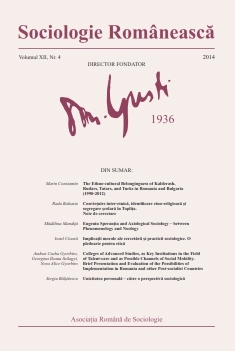Unicitatea personală – către o perspectivă sociologică
Personal Uniqueness – towards a Sociological View
Author(s): Sergiu BălţătescuSubject(s): Sociology, Social differentiation
Published by: Editura Eikon
Keywords: personal uniqueness; biases; consumption; well-being; sociological interpretation;
Summary/Abstract: In this paper we review the biases associated with the sense of personal uniqueness: better than-average effect, illusory superiority, person-positivity bias, leniency error, sense of relative superiority,third-person effect, unrealistic optimism, illusion of control, and Lake Wobegon effect. These biases are encountered in many domains of life such as health behaviours, driving, academic life, media use, personal relationships and happiness. Explanations offered until now are either motivational (the need to increase and maintain self-esteem) or non-motivational (such as informational differences, focalism, naive realism or egocentrism). However the sociological explanations cannot be ignored, parts of these effects being discussed in known theories in the field such as spiral-of-silence (Noelle-Neumann), organic solidarity(Durkheim), social distance (Bogardus) and social systems (Parsons). Likewise, the positive effects of personal uniqueness (self-enhancement, happiness in relationships, and recovery after traumatic events) are socially constructed and the line between functional and dysfunctional is rather thin. The negative effects exist at individual level (lack of strong health prevention measures, permeability to the damaging media messages, and consumerist attitudes). At societal level, the dangers are rather neglected but may be even more serious: exacerbated personal uniqueness may conduce to an erosion of solidarity, of interpersonal and political trust, of individuality and of tolerance. Remedies are in most cases hard to find and implement,giving the complex nature of these biases, the resistance that individuals and organizations oppose to the debiasing strategies.
Journal: Sociologie Românească
- Issue Year: 12/2014
- Issue No: 04
- Page Range: 75-87
- Page Count: 13
- Language: Romanian

